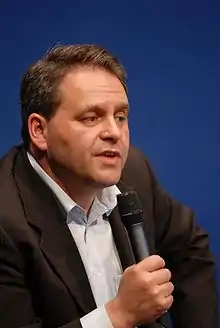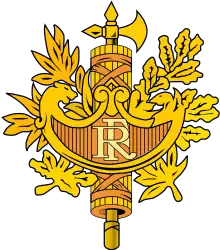Xavier Bertrand
Xavier René Louis Bertrand (French pronunciation: [ɡzavje bɛʁˈtʁɑ̃]; born 21 March 1965) is a French politician who has been serving as president of the regional council of Hauts-de-France since the 2015 regional elections.
Xavier Bertrand | |
|---|---|
 | |
| President of the Regional Council of Hauts-de-France | |
| Assumed office 4 January 2016 | |
| Preceded by | Claude Gewerc (Picardy) Daniel Percheron (Nord-Pas-de-Calais) |
| Mayor of Saint-Quentin | |
| In office 4 October 2010 – 14 January 2016 | |
| Preceded by | Pierre André |
| Succeeded by | Frédérique Macarez |
| Minister of Labour, Employment and Health | |
| In office 14 November 2010 – 10 May 2012 | |
| Prime Minister | François Fillon |
| Preceded by | Éric Woerth (Labour, Solidarity and Civil Service) Christine Lagarde (Economy, Industry and Employment) Roselyne Bachelot (Health and Sports) |
| Succeeded by | Michel Sapin (Labour, Employment and Social Dialogue) Marisol Touraine (Social Affairs and Health) |
| Secretary-General of the Union for a Popular Movement | |
| In office 5 December 2008 – 17 November 2010 | |
| Preceded by | Patrick Devedjian |
| Succeeded by | Jean-François Copé |
| Minister of Labour, Social Relations and Solidarity | |
| In office 18 May 2007 – 15 January 2009 | |
| Prime Minister | François Fillon |
| Preceded by | Jean-Louis Borloo (Labour, Social Cohesion and Housing) |
| Succeeded by | Brice Hortefeux (Labor, Social Relations, Family, Solidarity and the City) |
| Minister of Health and Solidarity | |
| In office 2 June 2005 – 26 March 2007 | |
| Prime Minister | François Fillon |
| Preceded by | Philippe Douste-Blazy (Health and Sports) |
| Succeeded by | Philippe Bas (Solidarity, Health and the Family) Roselyne Bachelot (Health, Solidarity, Social Security, the Elderly, Handicapped Persons and the Family) |
| Personal details | |
| Born | 21 March 1965 Châlons-sur-Marne, France (now Châlons-en-Champagne) |
| Political party | Union for a Popular Movement (Before 2015) The Republicans (2015–17) |
| Spouse(s) | Emmanuelle Gontier (m. 1998) |
| Children | 3 |
| Alma mater | University of Reims Champagne-Ardenne |
Earlier in his career, Bertrand was Minister of Health from 2005 to 2007 in Dominique de Villepin's government under President Jacques Chirac, then served as Minister of Labour, Social Affairs and Solidarity from 2007 to 2009 and as Minister of Labour, Employment and Health from 2010 to 2012.[1] He played a leading role in Nicolas Sarkozy's presidential campaign in 2007. He was a member of Union for a Popular Movement, later The Republicans, until 11 December 2017, when he announced that was "definitively leaving" the party after Laurent Wauquiez was elected the leader of the party.[2]
In 2020, Bertrand publicly expressed interest in challenging incumbent President Emmanuel Macron in the 2022 French presidential election.[3][4]
Early life and education
Bertrand was born on 21 March 1965 in Châlons-sur-Marne, in the Marne département, of the Champagne-Ardenne région of France. He studied in Reims, where he obtained a master's degree in public law, then a Diplôme d'Études Supérieures Spécialisées (DESS) in local administration.
Bertrand began his professional life as an insurance agent.
Political career
Early beginnings
At the age of sixteen, Bertrand volunteered for the Rally for the Republic (RPR) and quickly went into politics.
In 1992, Bertrand led the campaign for the 'no' to the Maastricht Treaty in his department, the Aisne in the region of Picardy. He was at the time assistant to the mayor of Saint-Quentin, Aisne. He was one of the pioneers of the 'Saint-Quentin beach', an event similar to Paris-Plage. From 1997 to 2002, he was parliamentary assistant to Jacques Braconnier, Senator for the Aisne, and he was elected to the National Assembly on 16 June 2002 for the 18th legislature (2002–2007), representing the second constituency of the Aisne Department.
In 2003, Alain Juppé, President for the Union for a Popular Movement (UMP), put him in charge of leading the debate and explaining the subject of pensions reform during a "Tour of France". He was chosen to defend this draft bill in the National Assembly. At the same time he was part of the 'Club de la boussole,' a group of deputies who declared their loyalty to then-President Jacques Chirac and Prime Minister Jean-Pierre Raffarin.
Career in government
During this period, Bertrand received favourable attention in the right-wing political milieu. On 31 March 2004, when Raffarin appointed his third government, Bertrand was named Junior Health Minister for Health Insurance. Under his Senior Minister, Philippe Douste-Blazy, he led the reform on health insurance. Later on, he pronounced himself strongly in favour of a European Constitution for the referendum on 29 May 2005.
After the majority of the French electorate answered "no" to the referendum, Raffarin resigned as Prime Minister. Under his successor Dominique de Villepin, Bertrand became the Senior Minister for Health, when Douste-Blazy was reappointed Foreign Affairs Minister. His mandate as Health Minister was marked by the chikungunya epidemic and the law against smoking in public places, ratified in 2004.
Bertrand announced his support to UMP presidential candidate Nicolas Sarkozy on 29 September 2006. He was named Sarkozy's official spokesperson on 15 January 2007. He quit the government on 26 March to devote himself fully to the campaign. On 18 May 2007, he was named Minister of Labour, Social Affairs and Solidarity in the new Prime Minister François Fillon's government.
On 19 June 2007 Bertran was appointed Minister of Labour, Social Affairs and Solidarity in Fillon's second government after the first one handed in its resignation the day before for rehandling after government number two Alain Juppé, Minister of Ecology and Development and the only Minister of State, resigned after having lost in the legislative race to deputy of Bordeaux. He then served as Minister of Labour, Employment and Health from 2010 to 2012.
Later career
Following the 2012 French legislative election, Bertrand announced his candidacy for the post the UMP parliamentary group’s chair. Having been endorsed by François Fillon, he lost an internal vote against Christian Jacob.[5]
In the 2015 regional elections, Bertrand won over Marine Le Pen and became the president of the Regional Council of the Hauts-de-France.[6]
Amid the Fillon affair, in March 2017, Bertrand joined Valérie Pécresse, Christian Estrosi and others in calling for Alain Juppé to replace François Fillon as the party’s candidate in the 2017 French presidential election.[7][8]
He is tipped to be a candidate for the 2022 presidential election. According to polls, he would be in 3rd position behind Emmanuel Macron and Marine Le Pen.
Political positions
In 2013, Bertrand led a group of fellow UMP politicians who joined forces with the Green Party in trying to force a constitutional review of a new law introduced by the Socialist Party which expanded government powers to monitor phone and Internet connection data. However, in a blow to the campaign, UMP parliamentary group leader Christian Jacob later wrote to his colleagues that the group would not seek a legal review.[9]
In July 2014, Bertrand defended President François Hollande’s decision to push ahead with delivery of a Mistral-class amphibious assault ship to Russia in defiance of calls by key allies, despite the Ukrainian crisis; the deal was later called off.[10]
Personal life
Bertrand was married to Emmanuelle Gontier, advisor on human resources, on 11 July 1998. They have three children, two of whom are twins. He has been a member of the Grand Orient of France since 1995.[11]
References
- "Assemblée nationale ~ Les députés : M. Xavier Bertrand" (in French). Assemblée nationale. Retrieved 7 June 2010.
- Loïc Le Clerc (11 December 2017). "Alors que Laurent Wauquiez est au 20h de TF1, Xavier Bertrand annonce sur France 2 qu'il quitte Les Républicains". Europe 1. Retrieved 11 December 2017.
- Victor Mallet (July 1, 2020), French centre-right faces identity crisis Financial Times.
- Tangi Salaun and Laurence Frost (September 20, 2020), Macron challenger presses France to save tyre plant Reuters.
- Christian Jacob reste président du groupe UMP Europe 1, June 20, 2012.
- Matthias Blamont and Ingrid Melander (December 13, 2015), France's Le Pen says far-right rise unstoppable despite defeat Reuters.
- John Irish (March 5, 2017), French conservative party heavyweights to push for Fillon alternative, says senior politician Reuters.
- John Irish and Andrew Callus (March 5, 2017), French conservatives in disarray as Fillon clings on Reuters.
- Emile Picy and Leila Abboud (December 12, 2013), Opponents of French surveillance law race to get support for review Reuters.
- Yann Le Guernigou (July 22, 2014), France to deliver first warship to Russia despite allies, Ukraine Reuters.
- (in French) « Oui je suis franc-maçon » Archived 25 February 2008 at the Wayback Machine interview by Christophe Barbier, in L'Express, 20 February 2008
| Political offices | ||
|---|---|---|
| Preceded by Philippe Douste-Blazy as Minister of Health and Sports |
Minister of Health and Solidarity 2005–2007 |
Succeeded by Roselyne Bachelot as Minister of Solidarity, Health and the Family |
| Succeeded by Philippe Bas as Minister of Health, Solidarity, Social Security, the Elderly, Handicapped Persons and the Family | ||
| Preceded by Jean-Louis Borloo as Minister of Labour, Social Cohesion and Housing |
Minister of Labour, Social Relations and Solidarity 2007–2009 |
Succeeded by Brice Hortefeux as Minister of Labor, Social Relations, Family, Solidarity and the City |
| Preceded by Éric Woerth as Minister of Labour, Solidarity and Civil Service |
Minister of Labour, Employment and Health 2010–2012 |
Succeeded by Michel Sapin as Minister of Labour, Employment and Social Dialogue Marisol Touraine as Minister of Social Affairs and Health |
| Preceded by Christine Lagarde as Minister of Economy, Industry and Employment | ||
| Preceded by Roselyne Bachelot as Minister of Health and Sports | ||
| Preceded by Pierre André |
Mayor of Saint-Quentin 2010–2016 |
Succeeded by Frédérique Macarez |
| Preceded by Claude Gewerc as President of the Regional Council of Picardy |
President of the Regional Council of Hauts-de-France 2016–present |
Incumbent |
| Preceded by Daniel Percheron as President of the Regional Council of Nord-Pas-de-Calais | ||
| Party political offices | ||
| Preceded by Patrick Devedjian |
Secretary-General of the Union for a Popular Movement 2008–2010 |
Succeeded by Jean-François Copé |
